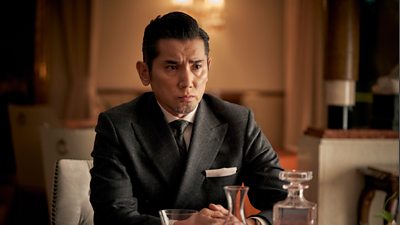Interview with Masahiro Motoki
Interview with Masahiro Motoki, who plays Fukuhara in Giri/Haji.

People cannot live without causing pain to others. And without pain, you cannot understand how others feel. Playing Fukuhara gave me a renewed understanding of how painful life can be.
What most impressed you about Joe Barton’s scripts?
I was interested in the complex and unique pace at which the story skips back and forth through time and space. The flashbacks weren’t just expositional, but felt like an awakening of the emotions and memories held by the present-day characters. The script included ideas, such as inserting an animated sequence, which made the script less of a written story and more a depiction of Joe’s complete creative vision. It had a three-dimensional quality.
What marks Fukuhara out from other Yakuza bosses we’ve seen portrayed on film?
I think he’s portrayed differently. Firstly, there’s his appearance. These days, you see less of the old-style Yakuza, with their short hair and kimonos, or loud suits with big gold accessories. Like Fukuhara, they dress well in sharp suits and have the air of elite businessmen. They tone down threatening behaviour in favour of acting like intellectuals. Some Yakuza organisations use their knowledge of the finance industry to develop businesses domestically and overseas. In present-day Japan, they’re called Intelli-Yakuza, or Intellectual Yakuza, and are viewed with caution.
On the surface, Fukuhara is this new type of Yakuza businessman, but on an emotional level he feels imprisoned by the power struggles and the Yakuza code of conduct, which he is starting to think are at odds with each other. So he is a very conflicted, human character.
I suppose that traditionally, Yakuza bosses live according to the dictates of the Yakuza’s moral code and aesthetics, but Fukuhara is slightly removed from that. Beyond his status as the head of an organisation, you catch glimpses of his vulnerable, or wavering, human side. I think a Yakuza boss who doesn’t fit the stereotypical mould of a person in power is quite new.
There are many clichés in Western entertainment about Japanese culture, and the Yakuza in particular. How do you feel this show addresses and subverts those?
It’s hard to say. It may help people to develop a new understanding of Yakuza as real people who suffer pain, rather than creatures from another world. Even in this show, some aspects of the Yakuza, such as finger-shortening [the practice of cutting off portions of one’s own finger as a form of atonement] and their moral codes and rules are exaggerated for entertainment, but I think it’s a well-balanced collage of reality and fantasy.
The world of the Yakuza is said to be grounded in Ninkyodo, a code of honour, and Bushido, the ethical code of the Samurai. In other words, it’s the spirit of self-sacrifice, whereby one must fight for those who deserve help or command respect. This notion of shared suffering has long been embedded in Japanese culture and remains intact to this day, albeit with some modifications.
Did you learn anything through playing Fukuhara?
People cannot live without causing pain to others. And without pain, you cannot understand how others feel. Having emotions which cannot be rationalised is part of being human. It gave me a renewed understanding of how painful life can be.
What was the shooting experience like for you? Were there any particular challenges?
It’s a subtle point, but… most of my character’s lines were in Japanese, translated from the English script. Since the translation was faithful to the original English script, including its word count, some of my lines were less succinct than they would have been in Japanese, and the language felt more descriptive. My fundamental thought was, “doesn’t he speak too much for a Yakuza boss?” [Laughs] It was a challenge to manage that whilst maintaining the dignity of a Yakuza boss.
What was it like to be directed by British directors in Tokyo?
For me it was a new experience, so I was worried about communication. But firstly, Julian (Farino) is the type of person who treats everyone equally. He has an engaging smile and is a strong unifying force, so I trusted him straight away. In addition to that, he is a highly experienced director with sharp instincts. The lines we spoke were in Japanese, but I was struck by how precisely he identified and controlled the actors’ gestures and expressiveness. It reminded me that, as an actor, conveying the nuance of your character is more important than delivering lines.
Executive Producer Jane Featherstone feels the series is less about ‘culture clash’ than highlighting what connects us all, whatever our culture. Did your experience making Giri/Haji reflect that?
I agree. Everyone has problems regardless of their position. Even small amounts of empathy create bonds which bring people together. Such bonds teach us how to feel pain and survive it. I think this show is led by that universal theme.
The Legend Of Giri/Haji
“Let me tell you a story. It
starts with Kenzo Mori. A Tokyo
detective, living a quiet life...
Until his younger brother comes to
him for help. Yuto. The black sheep
of the family. He’d done something
very stupid. But, as it turns out,
not everything can be fixed. Fast
forward a year and Yuto is dead.
Just another Yakuza that met his
end in a hail of bullets. Except
maybe not... Because as Kenzo is
about to find out, the past has a
way of coming back to haunt you.
Rumours start to circle that the
younger Mori brother may be alive
and living in a far-off land. And
soon Kenzo is on a journey to see
for himself. Kenzo and Yuto. A
killer and a saviour. But which is
which? Now, trouble follows Kenzo
everywhere he goes, but so, as it
turns out, does his daughter -
Taki. Sixteen years old. A brave
girl who befriends a lost boy.
Rodney. Half Japanese, half
English. He thinks if he talks loud
enough he won’t be able to hear his
demons. But he doesn’t know yet
just how loud they can scream.
On his way looking for his brother
Kenzo meets Sarah. Another cop
trying to escape something she
can’t outrun. Two people in a city
of eight million and they find each
other. So I suppose this isn’t just
a story about death. It’s a story
about life. And love. And
heartbreak. About the split second
decisions that we make and the
things we lose and win as a result.
It’s a story about gangsters.
(Abbot and Fukuhara)
Killers.
(Donna and Jiro)
Cowards.
(Vickers)
And heroes.
(Rei, Natsuko, Eiko,
Toshio)
It’s about two brothers. Engulfed
in chaos.”
